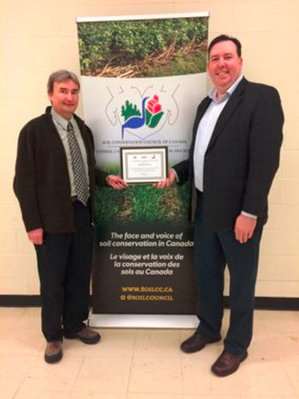Adam Hayes comments on his efforts to improve Ontario’s soil health
By Jennifer Jackson
Many farmers and agriculture representatives see improving soil health as crucial to their operations and the ag industry. Adam Hayes, soil management specialist for the Ontario Ministry of Agriculture, Food and Rural Affairs (OMAFRA), is one of those soil health advocates. And he’s showed it throughout his entire career thus far.
The Soil Conservation Council of Canada (SCCC) presented Hayes with the L. B. Thomson Conservation Award on Jan. 4.
Hayes’s career with OMAFRA includes various efforts prioritizing education in soil health. He’s worked alongside researchers and implemented soil health strategies with farmers in-field.
Hayes recently connected with Farms.com to reflect on his career and award.

Adam Hayes (left) accepts the L.M. Thomson Award from Alan Kruszel, chair of the SCCC. Source: SCCC
Farms.com (Farms): Do you have any comments on receiving the award?
Adam Hayes (AH): It is a great honour to receive this award – especially as it is a national award.
You work away every day hoping to make a difference, experiencing successes and setbacks. You patiently wait for change to happen. In my time with OMARFA I have seen progress being made on many fronts, including soil conservation and soil health. I accept the recognition but also acknowledge that it has been a joint effort with my colleagues, farmers, farm organizations, conservation authorities and others.
Farms: What has driven your career in soil health and conservation?
AH: From the beginning, seeing soil being lost from fields, eroded knoll, soil blowing or crusted fields pushed me to find ways to get the word out about soil conservation and, later, soil health.
(Also,) working with like-minded colleagues to help in developing strategies and new ways to get the soil conservation message out. (And) farmers who inspired me with what they were doing to improve their soils.
Farms: Why is soil health so important to recognize?
AH: Healthy soils are the key to sustainable crop production in Ontario. When soil health declines, crop yields are affected and there is more potential for negative environmental impacts.
Healthy soils are more resilient to adverse weather, help with greenhouse gas mitigation and sequestration, resist soil erosion and produce higher yields.
Farms: What has been the most rewarding aspect of your career thus far?
AH: The most rewarding aspect is seeing the renewed interest in soil the last few years. OMAFRA is leading the development of a soil strategy for Ontario with many interested partners. Farm organizations are helping to fund soil health research, including soil management topics in their meetings, and working with OMAFRA to put on soil-related field days and workshops.
Farmers are talking about soil health and finding innovative ways to maintain or improve the health of their soils. It is great when they take you to their field and show you the large number of earthworm middens (piles of casts), how easily the soil breaks apart or a fantastic stand of cover crop.
Of course, the most rewarding aspect is sticking a shovel in those fields and experiencing the look, smell and feel of a healthy soil!